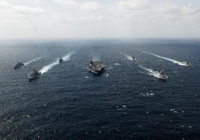South Korea's entry last week into the Proliferation Security Initiative (PSI) in response to a North Korean nuclear weapon test represented a long-sought objective of PSI proponents. For years, the Republic of Korea (ROK) government had delayed joining the program due to fears about how North Korea might respond. It took Pyongyang's May 25 test detonation of a nuclear device to prompt the South Korean government to commit to membership.
The PSI is a voluntary coalition of national governments that agree to collaborate against the illicit transfer of all weapons of mass destruction (WMD), their means of delivery (which in practice has meant mostly ballistic missiles), and related items.
The U.S. State Department formally welcomed South Korea's decision. When South Korean officials indicated in late March that they might join the PSI if North Korea tested another long-range missile, Minju Joson, a DPRK government-owned newspaper, warned that South Korea's possible entry was "a criminal scenario to ignite a war against compatriots by cooperating with foreign forces in their moves to isolate and stifle the DPRK." The statement added that, "The army and people of the DPRK will . . . take prompt retaliatory measures against them."

